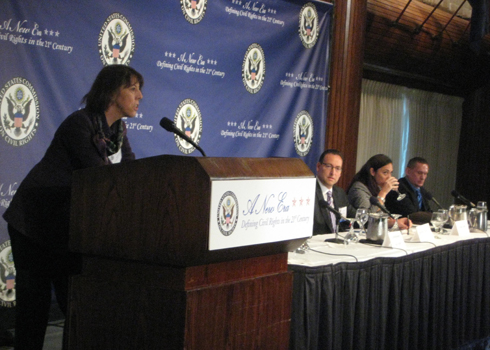About 60 people gathered at the National Press Club Tuesday afternoon for a panel on the future of the U.S. Commission on Civil Rights as part of the agency’s annual conference.
The question over whether the commission should continue to exist was brought up for discussion by the conservative members of the agency who planned the conference.
But two conservatives commissioners — one who moderated the panel and another who serves as chair of the commission — indicated they believe the agency still serves an important purpose. Commissioner Gail Heriot, an independent who has served as a GOP delegate, moderated the panel and sung the praises of the agency.
“If the value of a federal agency can be calculated on a per-dollar basis, it would not surprise me to find that the U.S. Commission on Civil Rights has been among the best investments Congress has ever made,” Heriot said, noting that it only accounted for 1/2,000th of a percent of the federal budget.
But, she said, at least two members of the panel didn’t share her enthusiasm for the work of the commission.
“You’re going to see that the commission is either very confident of its value, or very suicidal — we have stacked the deck against us” amongst members of the panel, Heriot said.
One such critic was Russell G. Redenbaugh, who quit the commission in 2005 and said Tuesday that the agency hadn’t maintained its relevance.
Mindy Barry, a former Republican staffer on the House Judiciary Committee who had been charged with overseeing the agency, said she was somewhere in between wanting to abolish the commission and supporting the commission.
Barry also criticized the commissioners who didn’t show up for the conference because they said they were not given a role in the planning.
“There are many reasons to criticize the agency, but one thing that strikes me is that there are commissioners that have gone on about how important civil rights are to them, and I have no reason to doubt that, except that there’s a glaring absence of those people in this conversation now,” Barry said. “You have to be at the table to have their voice heard.”
Kenneth Marcus, who served as staff director of the Civil Rights Commission as a George W. Bush appointee, said it was important to be having a discussion over the future of the agency.
“In the blogosphere, the commission was actually criticized for having a panel debating its own existence, as if it were a sign of lack of confidence or lack of commitment to its mission that it would actually have people come together and talk about whether it should exist,” Marcus said. “I think every year every agency should have to ask the question — are we still relevant, are we still required, what should we be doing, should we still have an agency?”
Marcus also defended the Commission’s controversial focus of an isolated instance of alleged voter intimidation involving members of the New Black Panther Party, which has been made the issue the topic of the agency’s enforcement report for 2010.
“It’s very controversial but it’s very important,” Marcus said. “The Commission is really the one agency and the one major organization can ask the question over whether the Department of Justice is doing the right thing there. It would be very unfortunate if the Obama administration or Congress blocked this investigation which is currently ongoing by the Civil Rights Commission.”
If the agency is to become effective, commissioners must stop partisan arguments, according to Barry.
“It was a very hard argument to go to my boss and get money when all he knew about agency was that it was squabbling,” Barry said.
Despite all the problems, the chairman of the commission told TPM that the agency has an important role to play.
“There are legacy issues that we’re still wrestling with, there are emerging issues that we’re steal dealing with. In my view there is still a tremendous amount of work left to be done in the context of civil rights,” Reynolds told TPMMuckraker after the panel. “While the Commission has its problems and we should give serious thought to reform efforts that can strengthen the organization. I still think that the value provided by the commission far exceeds some of the negative aspects.”
There have been calls for reform of the commission before. Last year, the Leadership Conference On Civil Rights issued a report which found the commission “is so debilitated as to be considered moribund” and recommended shorter term limits and the expansion of the commission’s mandate into human rights.
While noting that he will “turn into a pumpkin” when his term expires in December, Reynolds told TPM that he would support the commission evaluating the issue of Islamophobia.
“I think that it is an issue the commission should look into, I do think that there is a rising anger directed toward anyone who is from or who is perceived to be from the Middle East or who is Muslim and that’s what we’re here for,” Reynolds said. “That falls within our jurisdiction, it’s a national origin issue, so if I were to remain at the commission — which will not be the case — that would be an issue I would support.”
Other panels on Tuesday, some of which were broadcast on C-SPAN, addressed Ethnic and Racial Discrimination, Ethnic Disparities and Family Structure and Civil Rights in the 21st Century. Democratically appointed commissioner Michael Yaki said that the conference cost around $100,000.
(Ed. note: this post has been updated).






